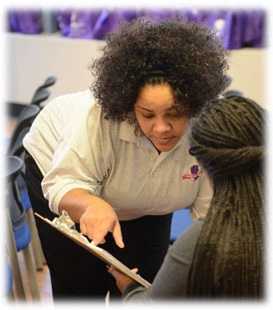Minnesota CHW Scope of Practice
| < Back | Next > |
|---|
 The scope of practice for Minnesota CHWs as defined by the CHW Policy Council comprises five role categories:
The scope of practice for Minnesota CHWs as defined by the CHW Policy Council comprises five role categories:
- Bridge the gap between communities and health and social service systems
- Navigate health and human services system
- Advocate for individual and community needs
- Provide direct services
- Build individual and community capacity
View Transcript
[SPEAKER]
The scope of practice for Minnesota CHWs as defined by the CHW Policy Council comprises five role categories:
- Bridge the gap between communities and the health and social service systems
- Help individuals navigate the health and human services system
- Advocate for individual and community needs
- Provide direct services
- Build individual and community capacity
These categories are similar to the range of CHW roles and functions discussed earlier in this series as a product of the National Community Health Advisor Study in 1998. Let’s look at the details of each of these roles as defined in Minnesota. The activities involved in the first role help clarify the term “bridging the gap,” which is often used as shorthand in the CHW field with no explanation. “Bridging the gap” may include:
- Aiding communication between provider and patient to clarify cultural practices
- Educating community members on how to use health care and social service systems
- Educating the health and social service systems about community needs and perspectives
- Establishing better communication processes
The second role is probably the most widely understood by people with limited exposure to CHWs. Activities are:
- Increasing access to primary care through culturally competent outreach and enrollment strategies
- Making referrals and coordinating services
- Teaching people the knowledge and skills needed to obtain care
- Facilitating continuity of care by providing follow-up
- Enrolling clients in programs such as health insurance and public assistance
- Informing clients of, and linking them to, available community resources
The third role, advocacy, is generally less well understood than the first two roles, although it appears in virtually all definitions of the CHW occupation. Activities include:
- Articulating to others and advocating for community and individual needs
- Being a spokesperson for clients when they are unable to speak for themselves
- Involving participants in self and community advocacy
- Mapping communities to help locate and support needed services
The third and fourth points under this category may require elaboration. Simply advocating on behalf of clients and the community is generally not enough. Unless the CHW encourages community members to advocate for themselves and their community, further dependence is created. The fourth role, Providing Direct Services, folds health information, education, and other services into a broad definition as “direct service,” including:
- Promoting wellness by providing culturally appropriate health information to clients and providers
- Educating clients on disease prevention
- Assisting clients in self-management of chronic illnesses and medication adherence
- Providing individual social and health care support
- Organizing and/or facilitating support groups
- Referring and linking to preventive services through health screenings and health care information
- Conducting health-related screenings
Finally, in their capacity-building role, CHWs cultivate the ability of individuals, families, and communities to improve their own health through:
- Building individual capacity to achieve wellness
- Building community capacity by addressing social determinants of health
- Identifying individual and community needs
- Mentoring other CHWs
- Seeking professional development, such as continuing education
CHWs are encouraged to go beyond conventional topics, such as nutrition and physical activity, and help communities understand and address the underlying social, economic, and behavioral determinants of health. This role category also addresses building capacity among CHWs themselves through professional development.
- Page last reviewed: February 4, 2016
- Page last updated: February 4, 2016
- Content source:



 ShareCompartir
ShareCompartir